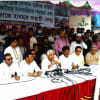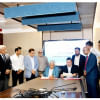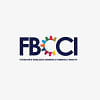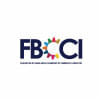FBCCI demands removal of tax at source for supply of essentials

With people bearing the brunt of heightened inflation, the country's apex trade body yesterday urged the government to remove the source tax on the income from supply of essential commodities, including food grains, agricultural produce, and other essentials such as edible oil and sugar to contain prices from the next fiscal year.
"There is a provision to collect tax on agricultural products at the supply stage, which increases prices of consumer goods," said Mahbubul Alam, president of the Federation of Bangladesh Chambers of Commerce and Industry (FBCCI).
He made the proposal at the consultative committee meeting jointly organised by the National Board of Revenue (NBR) and the FBCCI at the Pan Pacific Sonargaon Dhaka.
At the meeting, the FBCCI placed tax related proposals to the NBR for consideration on behalf of businesses for the fiscal year 2024-25.
The apex trade body said at present, 2 percent tax at source is applicable on the supply of items such as rice, wheat, potato, onion, garlic, chickpeas, lentils, turmeric, pepper, maize, flour, flour, salt, edible oil, sugar, and all kinds of fruits among other items.
Such products should be exempt from taxes, Alam added.
Taking into consideration the current inflation and the real incomes of low-income individuals, the FBCCI president recommended that the tax-free income limit for individuals be increased by Tk 1 lakh to Tk 4.50 lakh and to fix it at Tk 5 lakh for senior citizens and women.
He further said there are currently about one crore TIN holders, but only around 35 lakh file income tax returns regularly.
He recommended setting up income tax offices at the upazila level to increase government revenue and bolster the tax-GDP ratio.
He also proposed to reduce the rate of tax at source to 0.50 percent from 1 percent for all export items, including garments, and continue it for the next five years.
Besides, he proposed reducing the income tax rate on cash incentives to 5 percent from 10 percent.
Considering tax at source as minimum tax, the effective tax rate for non-listed companies stands at around 50 percent although the current corporate tax rate for them is 27.5 percent, he said.
"There is no scope to reinvest and run business smoothly after paying about 50 percent of income as tax," he noted.
Alam also demanded the removal of a 15 percent tax on the income from provident and gratuity funds of private employees.
Regarding value added tax (VAT), he said only 3 lakh registered businesses pay vat regularly, but added that there are more than 4.33 lakh such businesses in the country. He asked to ensure that all business organisations of all city corporations, divisions and districts are registered.
If the measures are adopted, the number of taxpayers and revenue will increase, he said.
He also proposed the withdrawal of 3 percent and 5 percent advance income tax at the import stage, which increases costs of production.
Addressing the programme, Finance Minister Abul Hassan Mahmood Ali said the government would listen to suggestions from all sectors before preparing the budget.
He also said the government would work to take the country's economy to the next level.
Waseqa Ayesha Khan, state minister for finance, said the time has come to address the anti-export bias in order to grow the exports.
Abu Hena Md Rahmatul Muneem, chairman of the NBR, warned that there would be no tax emptions after Bangladesh graduates from least developed countries (LDC) status and that internal resource mobilisation would have to increase for sustainable economic development.
Zaved Akhtar, president of the Foreign Investors' Chamber of Commerce and Industry, said they had been requesting the implementation of an online income tax filing system for a long time.
But although some online activities have been introduced, the system has not been fully implemented yet, he alleged.
Among others, Md Amin Helaly, senior vice-president of FBCCI, Md Wahiduzzaman, president of the Real Estate and Housing Association of Bangladesh, and Ashraf Ahned, president of Dhaka Chamber of Commerce and Industry, spoke the meeting.

 For all latest news, follow The Daily Star's Google News channel.
For all latest news, follow The Daily Star's Google News channel. 







Comments